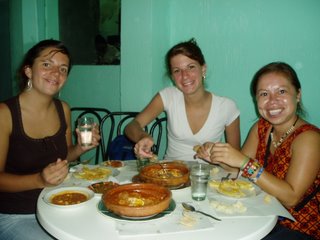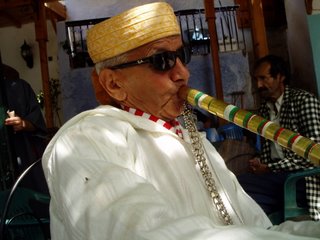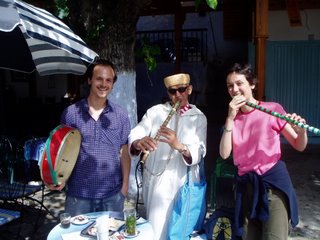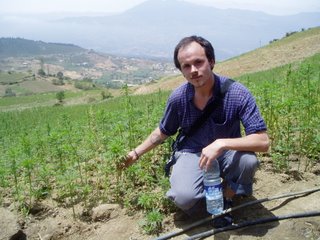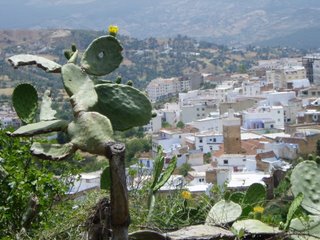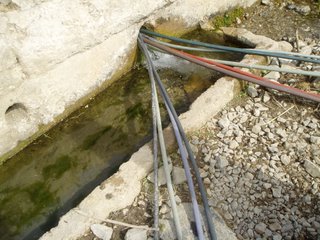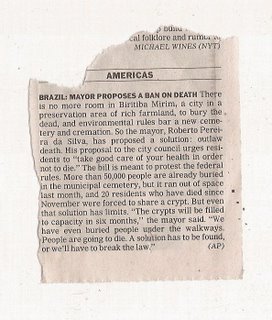In 2004, the director Sergio Arau released a film entitled, "A Day Without a Mexican." From a critical and artistic standpoint, the movie was a complete failure--the acting was terrible, the dialogue was flat, and as one IMDb reviewer said, it had "the subtlety of a brick."
Nonetheless, the premise of the movie was interesting--one day the people of California wake up, stretch, scratch themselves copiously, and look around to find that all the Hispanics of California have disappeared. They're just plain gone. Fruit rots in fields, rich men walk around in dirty clothes, restaurants close, and riots begin. The entire state, isolated by a (once again very subtle) mysterious cloud of thick mist, goes into a panic, and finally realizes the extent to which the Hispanic population supports every aspect of their lives.
This movie, lame as it is, has been getting a lot of attention lately, fueled by the plans for (and recent happening of) the May 1st economic boycots and demonstrations. Certain groups of immigrants around the country called for what was billed as a "Day Without Immigrants". They advocated worker walkouts, boycots, marches, and the construction of symbolic human chains.
Obviously the press was all over this story, and everyone, of course, had a different opinion. The liberals are talking about how this is like the civil rights movement of the 21st Century (the metaphor doesn't quite work) and the conservatives are freaking out because there were too many Che Guevara t-shirts and foreign flags. Everyone's going nuts.
Now, I'm no political pundit, but I'd like to consider a few things:
1. We shouldn't worry about Che Guevara t-shirts. Relax, Communism has been defeated, Che Guevara is dead and resurrected in the form of cotton haberdashery. Ask people wearing the shirt where he was born, what he did, how he died. Most won't be able to tell you.
2. Regardless of one's political opinions and leanings, it's important to realize that there is next to nothing that we can do to stop illegal immigrants from entering the country (for an interesting explanation of some of this, check out
Piero Scaruffi's web page). This is a rich country and Mexico (the source of the majority of the immigrants in question) is a poor nation (or better said, a nation with many poor people and very few extremely rich people). People will always cross the border. There will always be immigrants pouring into the country. And you can't kick 'em all out. It would take too long, this country really would go to shit, and it would cost too much money. And it would pretty damn mean.
3. Most economists that study the issue agree on the fact that the average worker is really barely affected (if at all) negatively by the presence of illegal immigrants. In fact, some economists have even said that the presence of immigrants is beneficial to many workers. People always talk about how much immigrants "take from Americans." What about all the stuff they buy and the taxes paid by many (obvious many do not as well) of them?
4. Everyone's freaking out about how many foreign flags are flying at these protests. Have these people ever taken a walk down through Little Italy? How many Italian flags do you see?
5. Finally--and I'm no conservative on the immigration issue--there is one point on which I think that I nearly agree with conservatives (or at least disagree with certain liberals). This is certainly not the 1960's Civil Rights movement all over again. Whether or not one supports making illegal immigrants citizens (I do), there are serious differences that must be considered between these two movements:
A. Illegal immigrants are not citizens, but in fact do benefit from many rights afforded to citizens (ie healthcare, education, etc). Blacks were citizens, and were not afforded many of these rights.
B. We all piss in the same place, drink water from the same fountains, and ride wherever we like on the bus.
C. Blacks were brought over here as slaves from Africa and then mistreated continuously for hundreds of years. Mexicans were not (except in certain terrible circumstances) brought over.
Whatever...like I said, I'm no political pundit....I just think that it's important not to distort the present or the past, but rather to look at the question at hand.
Anyway, I took a walk down to Union Square the other day to check out the protests. I was only there a little while, as it was hot as the dickens and really crowded, but it was a great time. People were cheering and singing and chanting. Babies and mothers and men and children were there. It really was a pretty exciting atmosphere, and it awed me to think of the number of people risking their jobs and deportation to fight for a better life and a citizen's rights here. (note: non-ironic statement)
After milling around with the people for a while and taking some mental notes, I noticed a couple of interesting things:
A. Communists all dress and look the same (I saw a few handing out copies of their newspaper and pamphlets and whatnot).
B. Some people just love protests--There were people there protesting all sorts of stuff that had little to do with questions
regarding immigration, unless you really stretch the issues at hand. I saw, for instance, people with anti-Imperialism posters and people with (the ubiquitous) Che Guevara t-shirts, and one guy in a military uniform, wearing a gay pride pin and a brandishing a sign against the war in Iraq. No wonder us lefties piss off and confuse so many people--we can't just stick to the damn issue at hand.
C. It was hot as hell.
I finally gave in to the concerted dual attack by Mother Nature and Senor Big Crowd Anxiety and retired to the cool and relative quiet of Whole Foods for a cold juice and a bird's eye view of the protest. And that's that.




